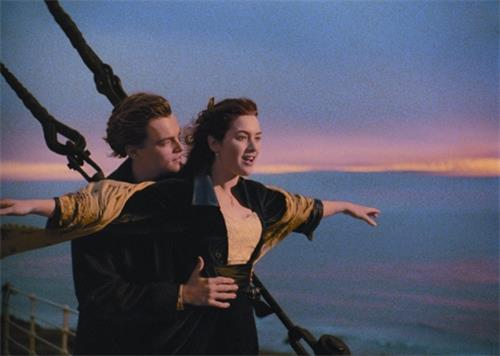
On April 10, 1912, the world’s most luxurious ocean liner, Titanic, set sail from Southampton to New York. Dubbed the “unsinkable” ship, it carried passengers from all walks of life, including a young aristocratic woman, Rose (Kate Winslet), and her fiancé, Cal (Billy Zane).
As an heiress of high society, Rose seemingly had everything, yet she felt trapped in a world of pretense and constraints. She was suffocated by her mother’s expectations, her fiancé’s arrogance and coldness, and an impending marriage that brought her no joy. Desperate, she decided to end her life by jumping into the sea. He courageously saved her and, from that moment on, opened the door to a whole new world for her.
Jack presence awakened something within Rose—an unfulfilled longing for liberation. He brought her to the spirited celebrations of the third-class passengers, where they danced freely and without restraint, and guided her to the ship's bow, where she stretched out her arms and felt as though she were soaring. In those moments, she discovered her true self, and Jack became her ideal—a man unburdened by rules, genuine, and fearless.
Though they came from vastly different worlds, their love deepened. Jack’s love was like a pure stream, washing away Rose’s doubts and hesitations. She realized that she was more than just Rose DeWitt Bukater—she could be free, unrestrained, and bold. As the song goes, “You opened my heart, you became a part of me, my heart will go on with you.”
But fate is often cruel. On the night of April 14, Titanic struck an iceberg, and just like Rose and Jack’s love, the ship’s fate plunged into crisis.
Jack, with his unwavering bravery and intelligence, helped Rose navigate countless dangers. In the final moments, he found a wooden panel that could keep her afloat, but it wasn’t strong enough to support them both. Understanding this, Jack chose to sacrifice himself, staying in the icy water while ensuring Rose’s survival. He knew that if he climbed onto the board, they would both perish. And so, in the harshest moment of all, he made the selfless choice—to give his love the chance to live, to pursue the freedom and happiness he had always wanted for her.
Jack’s death marked the end of their time together, but Rose’s life was forever changed by him. She lived on, carrying the courage and freedom he had given her, forging a new path for herself. No longer shackled by society’s expectations, she learned to embrace her true self. Though Jack was gone, his love continued to burn within her heart, inspiring her to live fully.
Their love was not just a fleeting romance between two people from different social classes—it was a profound testament to life itself. Short-lived yet unforgettable, their story echoes in the film’s most famous line: “My heart will go on.” Jack didn’t just teach Rose how to love—he taught her how to find her own truth and freedom in a world filled with constraints.
After the Titanic sank, Rose honored Jack’s memory by living a life he would have wanted for her. Like the stars over the ocean, their story continues to shine in the sky of love, never fading.

Chess Programs
How Do Chess Programs Defeat Top Grandmasters?
Chess, a widely loved intellectual game, has a history spanning over 400 years.

Scientific experiment
A Plastic Plate Shut Down This Lab for 79 Days
In criminal investigations, DNA plays an indispensable role, helping scientists identify suspects through genetic material found in cells.

The Barreleye Fish
Unveiling the Deep-Sea Mystery: How the Transparent Head of the Barreleye Fish Transforms Its Vision
The barreleye fish is a mysterious deep-sea species that inhabits depths of up to 2,500 meters. Its unique appearance and eye structure have long fascinated scientists.


